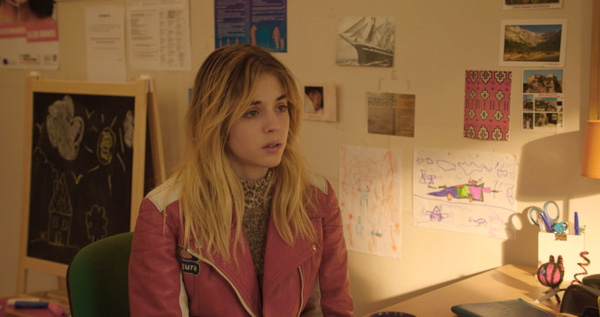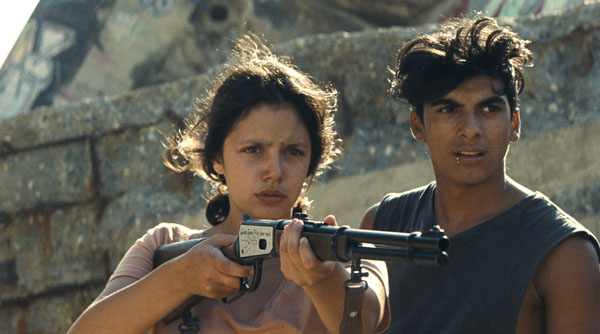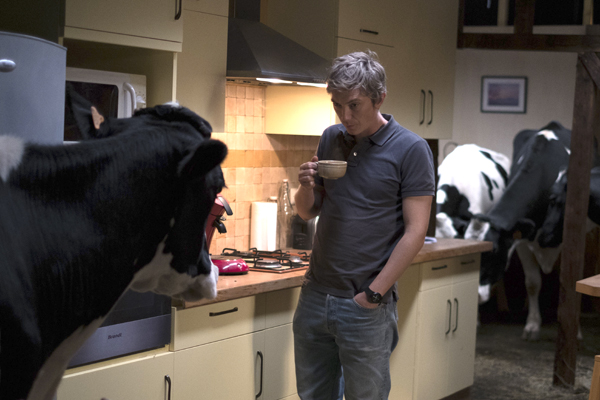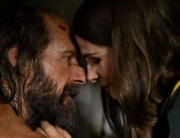You’ve got to wonder about the beds in which the programmers of this year’s Rendezvous with French Cinema sleep at night. Do they have only one side to get out of—the wrong side? Films in the series reflect a troubled mood, running the gamut from rage filled to woebegone, with precious few glints of humor or tenderness to lighten the darkness. Even the moodiest filmgoers might crave a rollicking French sex farce of yore, but the strong performances and sheer edginess of this year’s lineup can deliver a satisfying experience from a bleak cinemascape.
Vincent Macaigne’s film, with the odd title Comfort and Consolation in France, starts out with a homecoming. Pascal (Pascal Rénéric) and Pauline (Pauline Lorillard), a brother and sister who have bounced around the world in bohemian leisure, decide to return to their ancestral home in Orleans to share a last look at their past before the manse is sold.
A tentative Skype outreach between the two and a raw soliloquy by Paula set a nostalgic mood that is immediately shattered by Emmanuel (Emmanuel Matte), an old frenemy left behind. A nursing home worker worn down by his job, Emmanuel doesn’t just boil with fury and self-pity, he burns with hate for joggers, yuppies, NIMBYs, and spoiled, lazy children of privilege, like Pascal and Pauline, who got to fecklessly follow their bliss. “In another time they would have had their heads cut off!” he snarls to a dimwitted sidekick.
Not content with trashing his old pals behind their backs, Emmanuel starts openly attacking them. The pair at first seems a little passive and naïve about the scorn directed their way, but before long Pascal fights back. In a confrontation that seems to go on forever, Emmanuel takes the part of the oppressed: “Your Europe, your France, was built on guys like me…used as fertilizer!”
Pascal shouts back disdainfully, “Your shitty family! Oafs…Centuries from now, your descendants will be poor!”
Populist politics, class conflict, and a spirit of decay hang over the film, but the venom seems to come from somewhere more personal. Other old buddies stick their oars in, fomenting romantic misfires, more disputes, and not one but two wordless, angry dust-ups set during deafening music interludes. By the time Pascal and Pauline retreat in wan defeat, the rednecks are sad to see them go: there won’t be anyone left to hate. The prevailing mood is contempt. French moviegoers have returned the sentiment with hair-raisingly irritated and withering reviews on Internet message boards.
You may grow to appreciate Paula, the anti-heroine of Montparnasse Bienvenüe, but she’ll take some getting used to. In the film’s first few scenes, she cuts her head open banging it against the door and then smashes a window in a mental hospital. Motor-mouthed, borderline-disturbed Paula has come to Paris to reconnect with a photographer to whom she once served as part muse, part groupie. A go-for-broke performance by Laetitia Dosch brings an exasperating character to disturbing and occasionally touching life. Paula’s Paris is a heartless place haunted by elusive figures from her past, and watching this disheveled figure try to navigate the elegant city can feel overwhelming.
In her peregrinations around town, Paula steals (first a coat, next a pet, recalling the folksinger toting a cat through Greenwich Village in the Coen brothers’ Inside Llewyn Davis). She accosts strangers, interrupts conversations, scrounges places to stay from unwilling acquaintances, and applies for jobs in boutiques where the very sight of her makes chic saleswomen want to bar the door.
Lying her way into a bourgeois household, she becomes the world’s worst au pair, but Paula somehow wins over the child in her care, and she scores another gig where the staff is willing to size up her weirdness and look the other way. Director Léonor Serraille enriches scenes with spot-on details, like Paula’s conducting a passionate argument with a toothbrush lolling out of her mouth.
On one level, Paula lacks self-awareness. On another, she abides by her own offbeat moral code. Her brand of cockeyed integrity helps her achieve a tentative rapprochement with her surroundings, a peace that may be disrupted any minute, but it feels hard-won and welcome in the now. Not that it hasn’t been harrowing as hell getting there in this estimable, intense, and exhausting film.
Gilles Bourdos’s Endangered Species uses the more careworn parts of Nice as a setting for a Short Cuts, Magnolia, or Crash approach, balancing overlapping stories based on short fiction by Richard Bausch. A young groom (beady-eyed Vincent Rottiers) torments his pretty bride (Alice Isaaz) with cruel taunts on their wedding night, setting a foreboding tone for their marriage. A father (Eric Elmosnino) faces off in a tense phone call with his daughter as she shares unwelcome news. And an awkward young student (Damien Chappelle) finds himself forced to take charge of his haughty mother, who has torched her car by the roadside and ended up in a mental hospital. Cinematographer Mark Lee Ping-bing burnishes night shots in glowing peach and copper, creating a rich yet claustrophobic atmosphere for these unhappy slices of life.
Some of the plotlines are realized better and fit together more naturally than others. The doomed marriage with its crescendo of escalating domestic violence captures Bourdos’s deepest focus, although a descent into tragedy comes as no great surprise. The father’s narrative benefits from a lighter touch and the character’s aloofness in a movie that often tells more than it shows. The third story line tries too hard to make us pity the lonely nerd stuck with a crazy mother and who looks for dates in the most unpromising places. We feel something bad is going to happen to this young man—and it is still wrenching and horrible when it does. Nice may look golden but grief pours down on Endangered Species like Magnolia’s pestilential rain of frogs.
Ava is another of the festival’s visually more showy entries, kicking off with an artfully composed, candy-colored beach tableau of holiday-makers frolicking on the shore. A black dog darts through the crowds, nuzzling a sleeping girl and waking her from a nap. The pitch-black pursuer is a warning of a darkness waiting to envelop the girl’s world: 14-year-old Ava (Noée Abita) has retinitis pigmentosa, an eye disease that will encircle and narrow her field of vision.
Stuck for the summer with her well-meaning but man-crazy and not very responsible single mother, Ava conducts dangerous experiments with a blindfold to accustom herself to encroaching blindness. She steals the dog from his owner, a black-clad Spanish teen named Juan (Juan Cano), and plays come-hither games with the boy after he steals the dog back. Cops on black horses lurk like avenging angels on the beach, ready to pounce on the teenage rebels. When Juan and Ava smear their bodies with mud like the rockers on the Slits’ first album cover and start robbing nude beachgoers with rifles, you may think the cops have a point.
As Ava’s rebellion smolders into nihilism and the action shifts to a raucous Romany wedding, the film loses sight of Ava’s blindness as a motivator. This daring, puzzling, and sometimes obsidian-dark work flirts with symbolism, magic realism, and romance. It’s at its best when it deals with Ava as she is: sullen, difficult, and moody, looking for a way out of boring everyday life. In other words, a typical teenager, although one whose vision for the future occludes a little more each day.
A straitlaced dairy farmer, Pierre is so devoted to his cows that he dreams they share his bedroom and living room. The opening dream sequence of Petit Paysan (Bloody Milk) provides a rare wry note in a story that starts out less than joyous and heads straight downward into complete misère.
In a committed characterization, Swann Arlaud plays earnest Pierre with every cell weighed down by wistful anxiety. Pierre milks, bathes, walks, and talks to his cattle daily, a routine that brings its comforts despite the hard work. One day Pierre notices that one of his cows is acting strangely. Could it be “the Belgian disease” he’s heard about? Authorities are quarantining and putting down cows struck with this contagious plague. However, his veterinarian sister (Sara Giraudeau) downplays his concern, but a cow’s sudden death leads Pierre to commit a crime. Of course, it’s not the crime but the cover-up that unravels a series of lies, and soon Pierre is plunged into new depths of worry.
Perhaps director Hubert Charuel intends the animals’ decline to underscore Pierre’s isolation. The young man’s circle is restricted to his elderly parents and his sharp-eyed sister, who is forced to become an enemy of a kind over the course of Pierre’s deceptions. A pushy local woman angling for an unwanted romance and a claque of boorish friends provide no relief at all; Pierre is truly alone with his flagging flock and his ruined business. Bloody Milk aims for a kind of livestock thriller effect as tension mounts. The film’s outcome does not thrill, though; it’s just full-stop triste.










Leave A Comment